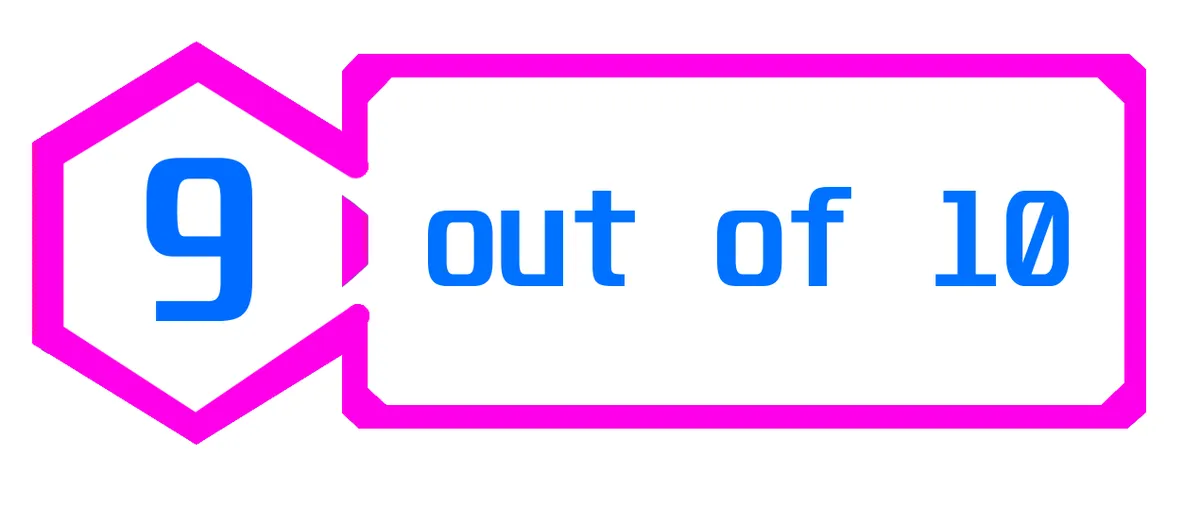Citizen Sleeper 2: Starward Vector REVIEW - the process of becoming
Rhianne Ward
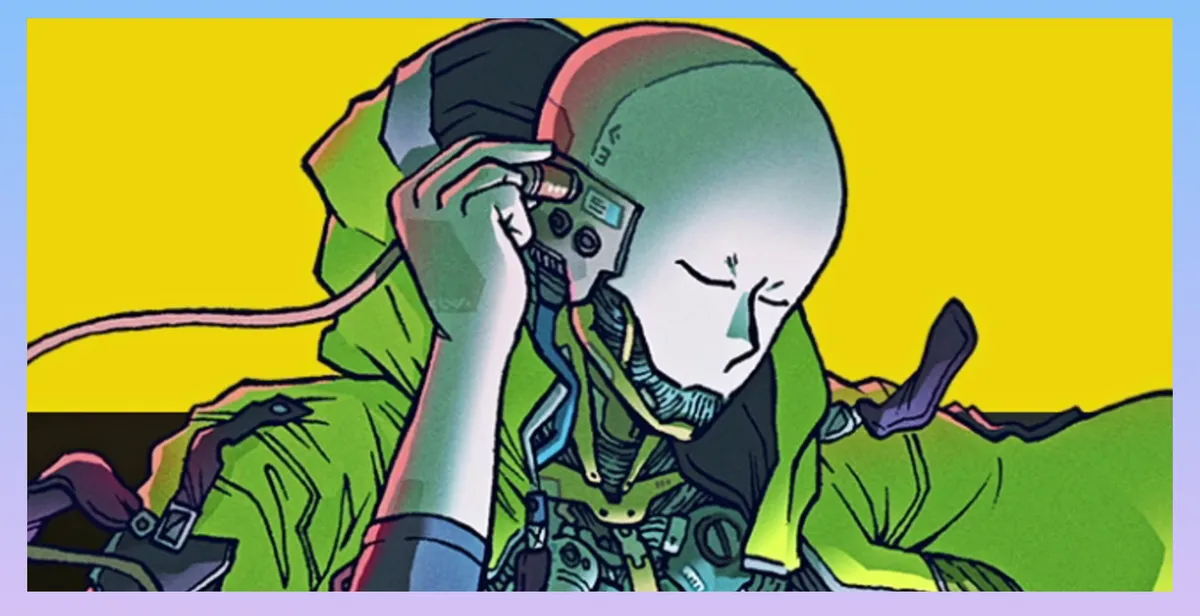
There's a lot of power in things. Objects, knick-knacks, junk, whatever you might call it. Every single physical entity that exists in this universe is inevitably imbued with history and meaning by simply existing for long enough. The bananas I bought the other day came from Colombia, grown from a tree that someone harvested and packaged, for transit across an entire ocean, all so they could land in my kitchen drawer. Maybe I'll eat them. More likely outcome is I forget they are there, and I have to throw them out when they get weird and gross. It's a bad habit of mine; I'm working on it.
People are much the same, of course. We are years, decades, maybe even a century of experiences, some remembered, most not, but all nonetheless shaping the way that we are, for better or for worse. I might forget about these bananas, like I said, but I'll remember the guilt I feel as I move them to the bin. Regardless, both of these things mattered. They helped shape who I am - maybe for a couple minutes, maybe longer than that. Probably the latter.
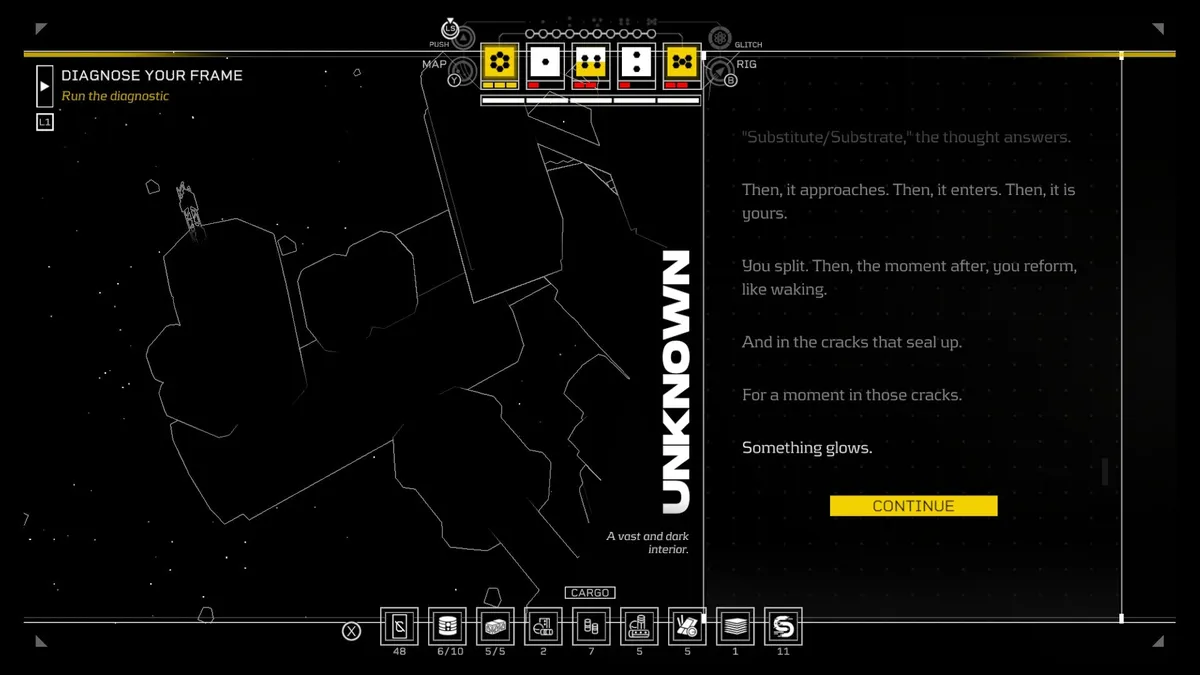
Citizen Sleeper 2: Starward Vector is the follow-up to - unsurprisingly - Citizen Sleeper. It is, for the most part, solo developed by one Gareth Damian Martin, who created this game under the developer name Jump Over the Age. I can't say I've tried their previous game, In Other Waters, but I am deeply, intimately, familiar with Citizen Sleeper. It's a deeply addictive experience about a robot called a Sleeper - that's you - who escapes their corporate servitude to a space station named Erin's Eye, where they must learn to survive in spite of a constantly deteriorating body and an ever-present hunger that requires satiating. It's a stressful game, in certain ways; you're given a set of dice - your actions - with every new cycle (day), which you must assign carefully depending on your immediate and future needs, while also following up on leads that may or may not prove to be a waste of time. You're never not aware of your fragility, and your dependency on others can often feel frustrating. Nevertheless, in your time surviving on the Eye, you meet a host of colourful characters, each with their own unique motivations and complicated ties to the station. You chat with them, help them out, and sometimes they help you right back. It's cool to see these arcs through, knowing that you invested something valuable and finite into them. Your actions feel weighty and deliberate in ways that they simply don't in other games. Not to mention, when you line up your dice just right, the results are unbelievably satisfying. At a certain point, you find a rhythm; you figure out the best ways to get medicine and food, while also keeping on top of deadlines, and succeeding in that juggling act is what makes Citizen Sleeper such an engaging experience.
Of course, there would be no reason to commit yourself in this way were the game itself not presenting you with something compelling. That's where Citizen Sleeper’s greatest strength lies: its writing. Characters are often layered, their motives difficult to parse and oftentimes twisted by mistruths. They, and thus the game itself, often ask a lot of blind trust from you, and sometimes that faith is betrayed, but most others follow through on their promises. In between interactions, the game's inner monologue is often spent pontificating on all sorts of things - your place in a universe that sees you as an object, the purpose of continuing on despite your never-ending struggles - and it does all of this with a deeply kind, considered tone. Despite its often bleak setting and circumstances, it's an intensely optimistic game about the power of people working together to achieve a common goal, and finding your place amongst all that.
I adore it. I never wrote a Favourite Games of 2022 list, but if I did, Citizen Sleeper would be at the top. This naturally puts the sequel in a precarious position for me personally. I recently said that this was the game I was most excited to play in 2025, and I understand that this places upon it extraordinary expectations. I never went into this expecting it to surpass my love for the first game - it's one of my favourites, after all - but I won't lie and pretend that there was a little voice that betrayed myself. Maybe, somehow, this sequel could leave an even greater impact on me. Did this happen? Well, I feel like that's a somewhat unproductive framing of the experience. I finished the game only a couple hours ago, after all. It wouldn't be a fair standard to set before the dust even begins settling.
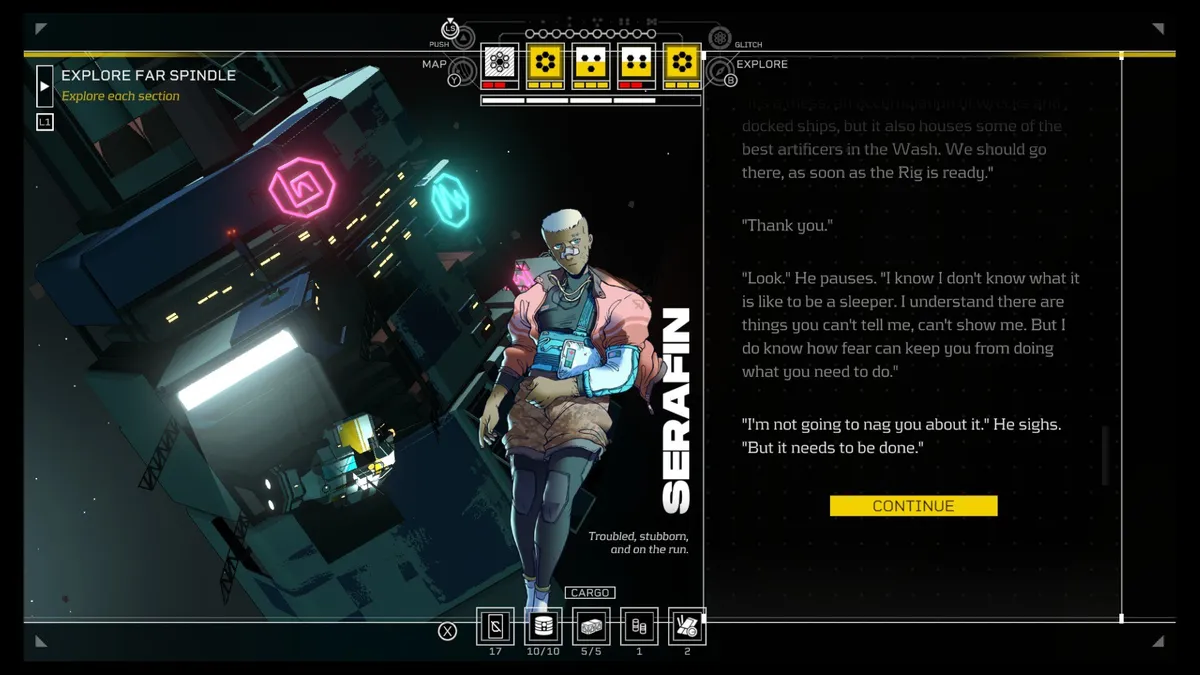
What I will say, however, is that my emotional experience playing Citizen Sleeper 2 was quite distinct from its predecessor, in ways both anticipated and surprising. The sequel takes the low-key stress of surviving on the Eye and turns those levels up considerably. The game introduces a “stress” metre, replacing the health bar of the first. Increasing your Stress levels by making bad choices or getting unlucky with rolls results in your dice suffering durability damage, which can cause them to break entirely, meaning you need to search out a valuable resource to get them fixed. In some ways, this is a slightly more forgiving system, given that Stress can be reduced quite easily, but depending on your circumstances, there's a possibility of lining up your dice in juuuust the wrong way for them to all break during a critical contract. Much like most of the survival mechanics in Citizen Sleeper, it is a manageable situation if you're paying attention, but the threat of everything falling apart due to blind luck is ever-present, and makes taking risks with dice rolls a constantly engaging endeavour.
Going back to those aforementioned contracts, they are a fresh addition to the Citizen Sleeper cocktail. You're no longer confined to a single space station, but with the power of intergalactic space travel, you can visit a handful of other stations! Each one has its own set of things to do and people to say, and sometimes those people will give you a contract to fulfil. This means picking out a crew, flying to a specific point nearby, and trying to pass a series of high-intensity checks. The context changes depending on the contract; in one case, I was lifting an engine core from an abandoned ship, in another I had to go undercover and help incite a mutiny on a corporate vessel, and so on. The level of diversity at play in these encounters is really impressive, and makes each job memorable. I think the dice system allows for such a breadth of expression, so Jump Over The Age can basically invent whatever situation they want and it always feels in line with the game mechanics.
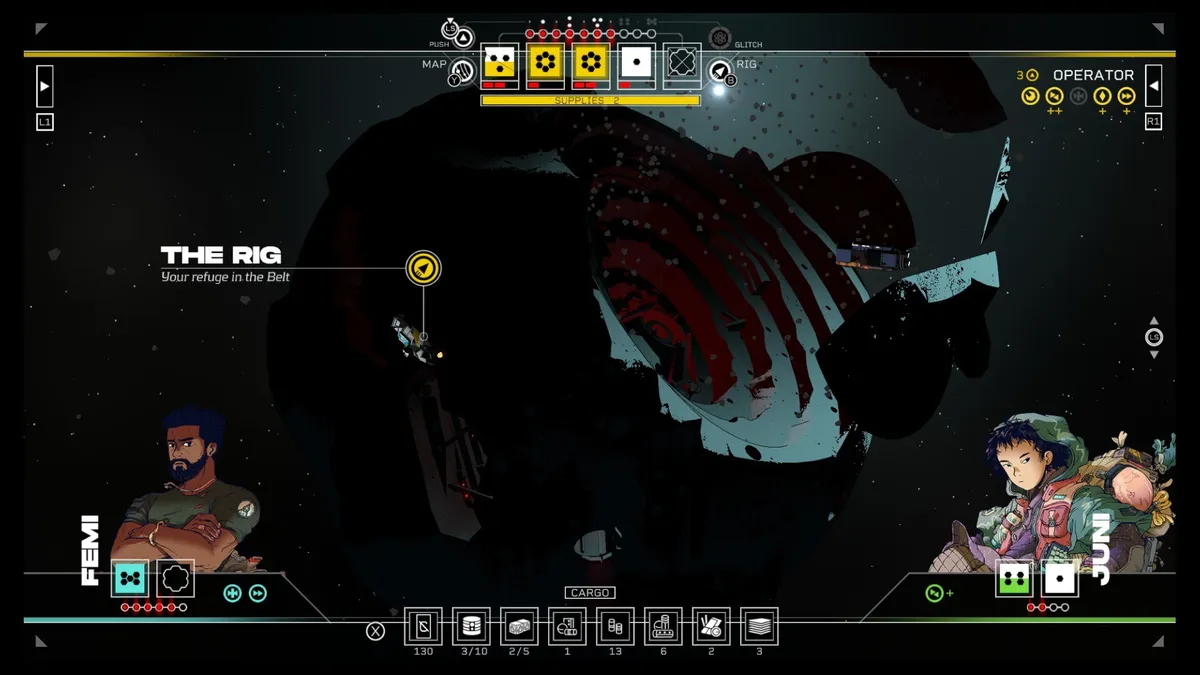
The emotional theme of every contract remains the same, though: tension. Citizen Sleeper has always mastered the art of making a set of bad rolls feel utterly devastating, but in contracts, the stakes are higher, so bad dice can mean the difference between success and failure in such a high pressure environment. You have your crew available to help, but their skills are specialised, so it's entirely possible to be stuck in a situation where all three of you are ill-fitted for the job, and you have to rely on blind luck to see yourselves through. It's riveting stuff, and while I don't think I ever actively failed any of the game's contracts, I know for certain that had I not carefully strategised with my dice, I would have had much worse outcomes.
I actually did make a mistake near the start of the game, though. Not in a contract, but I did run out of time for a deadline early on, at which point I was convinced that I had screwed up something terrible. As it turns out, the game is built around potential failures, even during plot critical moments, and if that's not the mark of a good RPG then I don't know what is. I would love to see a catastrophe run, where you make all the worst choices and fumble the heftiest bags. I imagine the game just kills you or something, but the idea compels me.
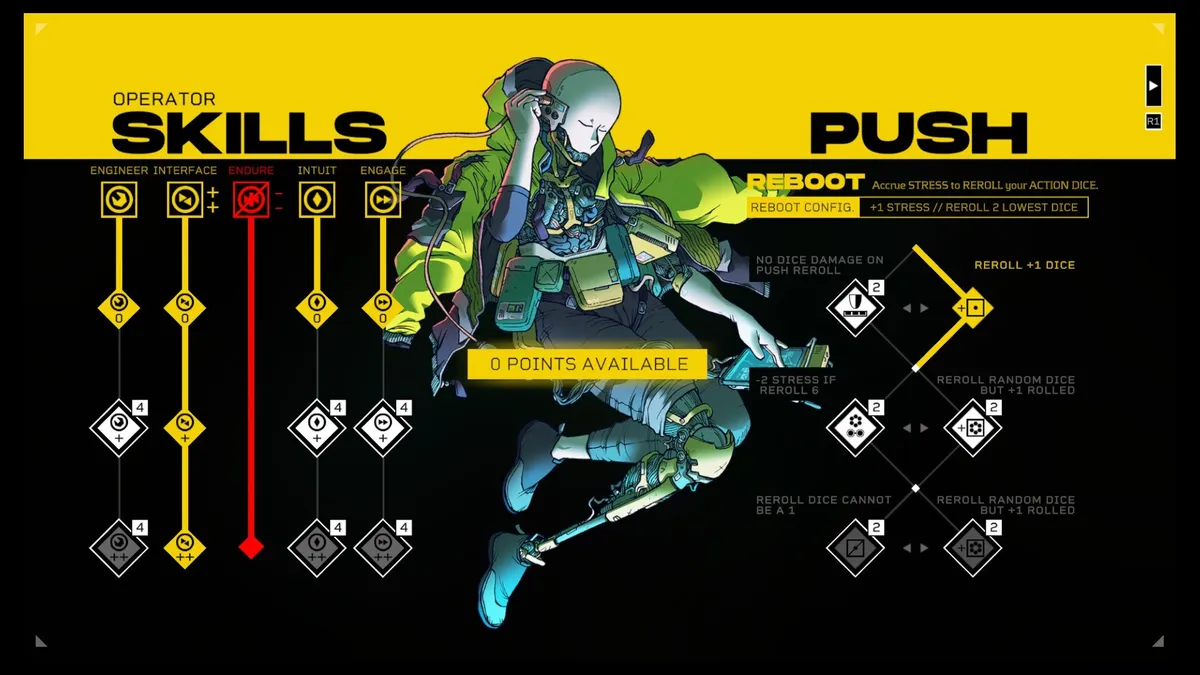
Citizen Sleeper 2 definitely feels replayable. For one, the player character picks a preset at the start of the game - three to choose from - and every single one wipes a skill type off the character sheet. I played an Operator, so all of my Endure checks were automatically nerfed, meaning that I would tend to avoid certain activities because I was so bad at them. Then, I would visit Helion's Port, where the only way to get fuel and supplies is via Endure checks, so I absolutely hated going there. Unfortunately, it was also a constant necessary stop in between places I actually wanted to be, so I had to make certain I was freshly stocked up on fuel before travelling there. This led to money problems, so I had to figure out the best way to scrounge up supplies and chits without much issue. All of a sudden, I'm playing a character who has a unique relationship to the world around them and their own struggles going through it, all born organically from mechanics. It's a wonderful trick.
I guess the point I want to make is that I love this change. I am eternally bad at one thing, which technically removes some freedom of choice from my arsenal, but as a consequence, I had to engage with the world and the mechanics in a very active way which is awesome. Some of my favourite RPGs are built with limitations implemented. Less options means more need to problem solve, and if your game is built to facilitate that kind of player expression, you're looking at an extremely good video game. Not to mention, being worse at some things means taking specific crewmates with you for contracts to cover your bases, which makes the whole crew feel like a genuine team, and that's cool too.
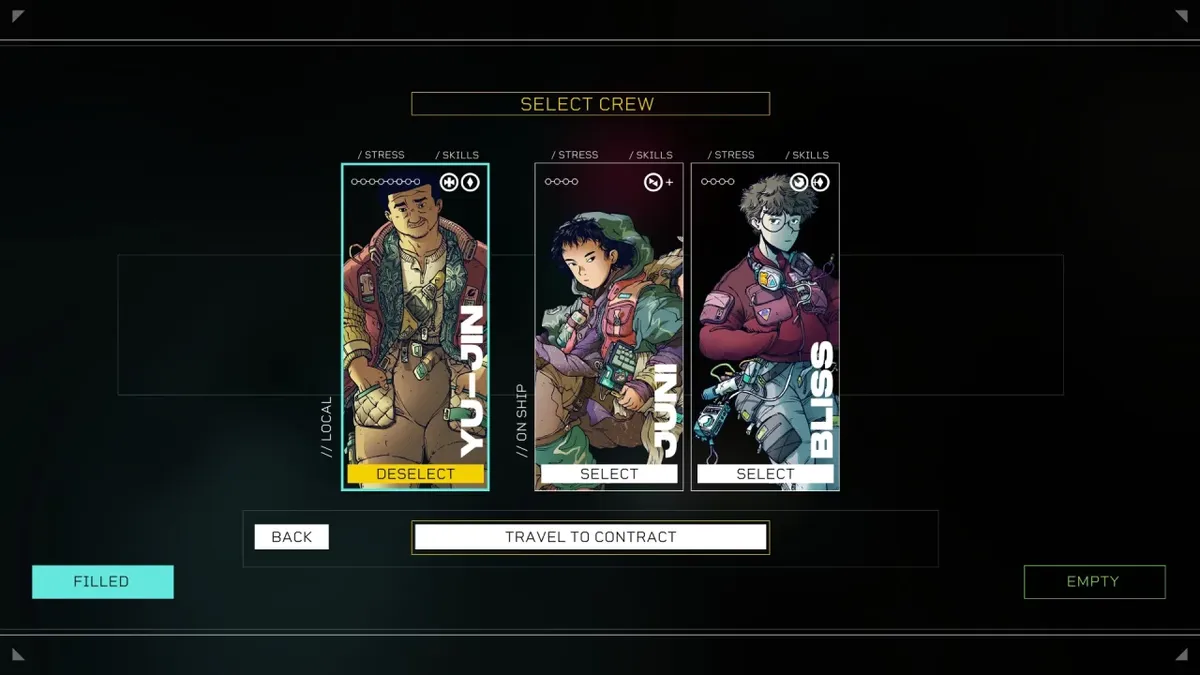
Let's talk about the crew a little. To be honest, it's the aspect of Citizen Sleeper 2 I'm the least fond of. The Party is a staple of RPGs. It's born from DnD games played with a group of friends, but video games have been implementing characters to travel alongside you since as far back as Dragon Quest. It's not surprising, in that sense, that Citizen Sleeper 2 decided to take this direction with its characters, especially considering the broadened scope that comes from its station-hopping aspirations. You can assemble a crew to join you on your little spacefaring vessel, the Rig, and they come with you on contracts, bringing with them their unique skills. They also have little storylines to follow, some more interesting than others. The most compelling to me was Juni, a hacker historian hoping to compile information on the long-defunct Solheim Corporation, whose collapse decades ago left the system reeling. I was also a fan of Yu-Jin’s storyline of chasing a vessel that could let him escape the system we're all trapped in, and the lengths he goes to realise that dream becomes more and more questionable the deeper down the hole you decide to follow him. Kadet’s relationship to an early game event is really compelling, the resolution there more nuanced than I had expected. The only crewmates quest that doesn't stick the landing is that of Femi and Nia, whose journeys, while solid enough, never quite reach the heights I'd come to expect from the rest of the game. Held up against their colleagues, their personal dilemma feels comparatively one-note and predictable, in ways where Citizen Sleeper is often so surprising. For a game as ambitious as this, made predominantly by a single person, not every element is going to hit, unfortunately.
In general, I wish there was more interaction with the crew. You don't really get to chat with them outside of their respective storylines or the odd contract, and once their conflicts are resolved, they kinda just exist in your general vicinity. Occasionally they'd chime in during a mission, and I'd have an awkward moment of remembering they were even there in the first place. There would be certain beats relating to the ship, like growing mushrooms or getting a paint job, where I would have expected the crew who live on it to at least have an opinion on these decisions I was making, but they kept quiet. To me, they just felt like NPCs like any others in the game, which doesn't feel correct when my character clearly trusts them more than the average person to be occupying space on my ship. Despite how interesting they often are as individual characters, it’s a bit of a missed opportunity to not see them more as a unit, with their own interpersonal dramas and relationships. I understand, however, that implementing something like this would have meant an awful lot more dialogue to write, a lot of which might be missed if you don't have certain crew members with you, either by choice or because you missed them. It's a tricky one, but in a perfect world, it would have been nice to get to know these guys on a deeper level.
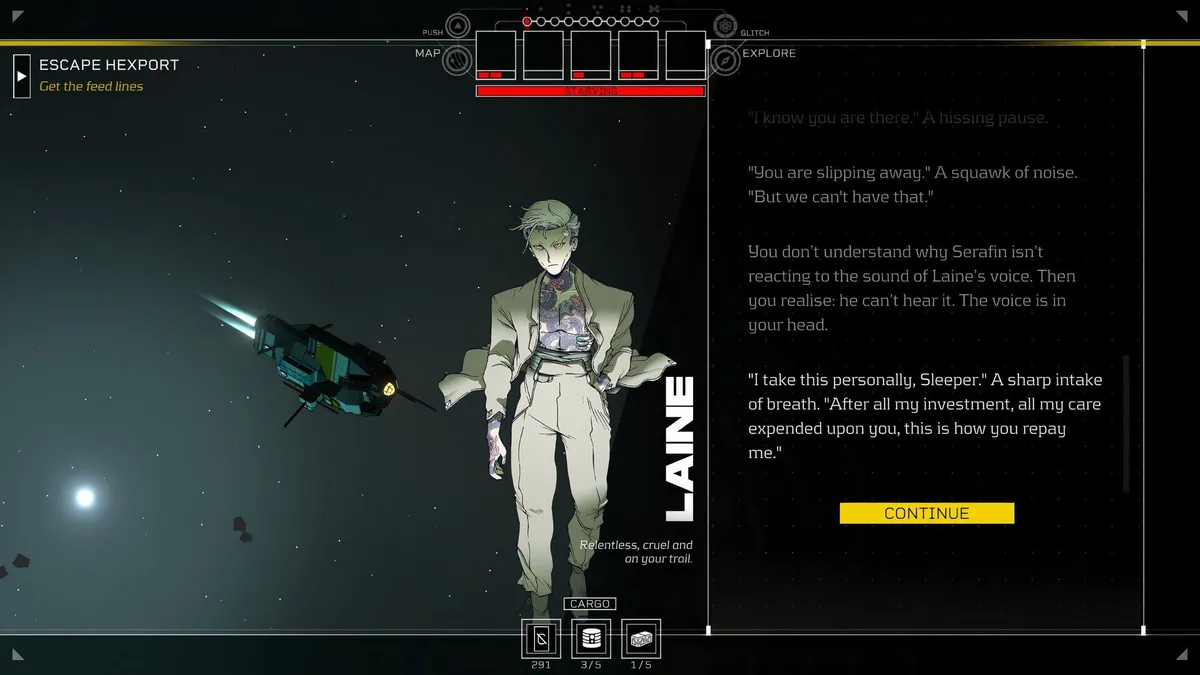
It's weird to talk about the writing in Citizen Sleeper 2 lacking in anything, because in every other sense, it is firing on all cylinders. I said near the start of this review that the game is a very different emotional experience to its predecessor, and a big part of that is down to the narrative framing. In the first Citizen Sleeper, you awake on the Eye, and the only priority is survival. Any other stories you encounter, or plots you unfold, are basically by accident in the context of the game. The game is quite laid-back in that sense, more concerned with letting you explore the area at your own pace than following any strict set of beats. There's a level of confidence that I respect, but I also kinda can't blame some of the game's detractors dropping it because of a lack of motivation or direction.
Citizen Sleeper 2 opens like a fucking gunshot. You're interrupted mid-escape by a mob boss who seeks to trap you and your friend in eternal servitude. You manage to get away, but you spend a majority of the rest of the game on the run from this guy. The game has a mechanic which incentivises you to keep moving, never staying in one place for too long. I never came close to being caught, but I was always aware that lingering overlong would mean my doom. It's a completely different vibe to the first game. As a result, too, on top of maintaining your various survival obligations, you're constantly chasing leads across the system. The story isn't a linear path, but your story - your personal journey through space - is always propelling forward. It's thrilling, and the game does fantastic work of making you feel hunted in a way that's actually organic and dictated by your choices.
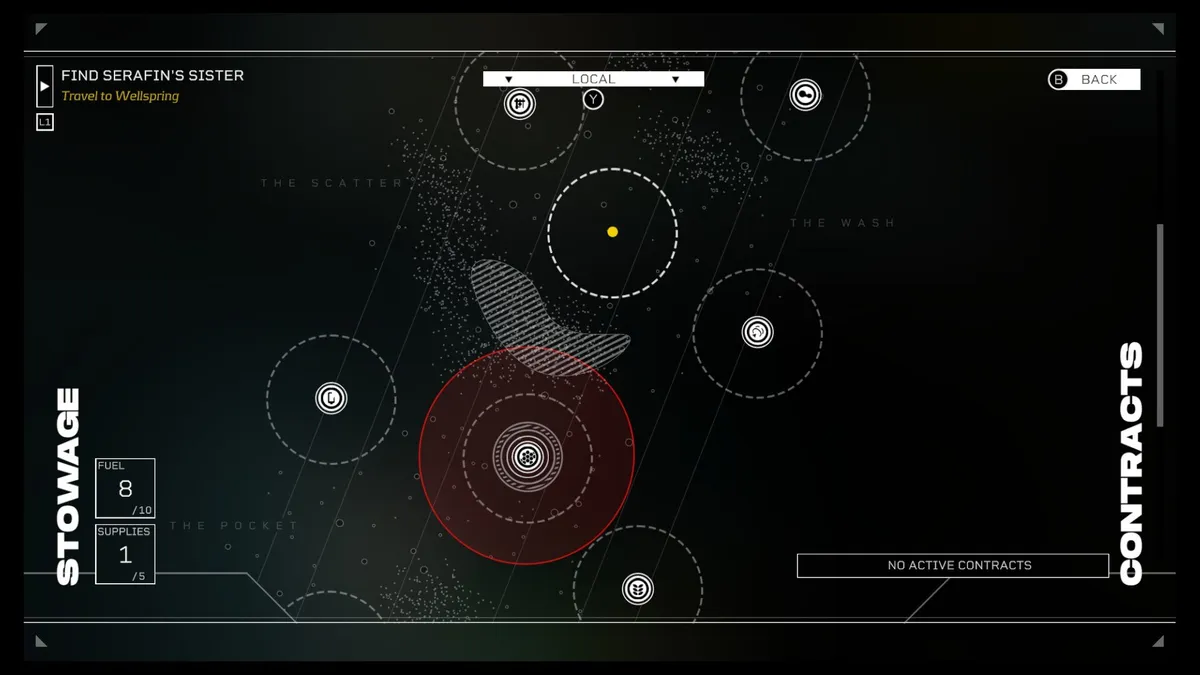
At a certain point, it starts to get exhausting. Your friend, Serafin, says as much too. He also becomes sick of running, of always looking over his shoulder. That lingering sense of dread is not a nice one, and you start to wonder if, amidst all that stress, is there even a point in trying? Even if you get this guy off your back, it'll just be something else that occupies your mind. Or my mind, I guess I should say.
While playing this game, I've been off work. I took a week out with my holiday allowance to rest and recuperate, but even with that, I couldn't help but let myself get worried about work, or life, or whatever else. It's really hard to get my mind to sit still when I'm in this state. I started playing Citizen Sleeper 2, confident that it would take my mind off things, only to be met by a game designed specifically to evoke this exact feeling in me. The dread, the anxiety, the exhaustion. Rather than take a break, though, I let the game consume me. I was locked in for three days straight, only playing Citizen Sleeper 2, only stopping every so often for social obligations (if you're reading this Amy, I don't mean this in a bad way, I loved seeing you!). I don't know why, but something in me needed to see this through. I think I wanted to play a version of reality where I could get through this feeling, and exit the other side a victor.
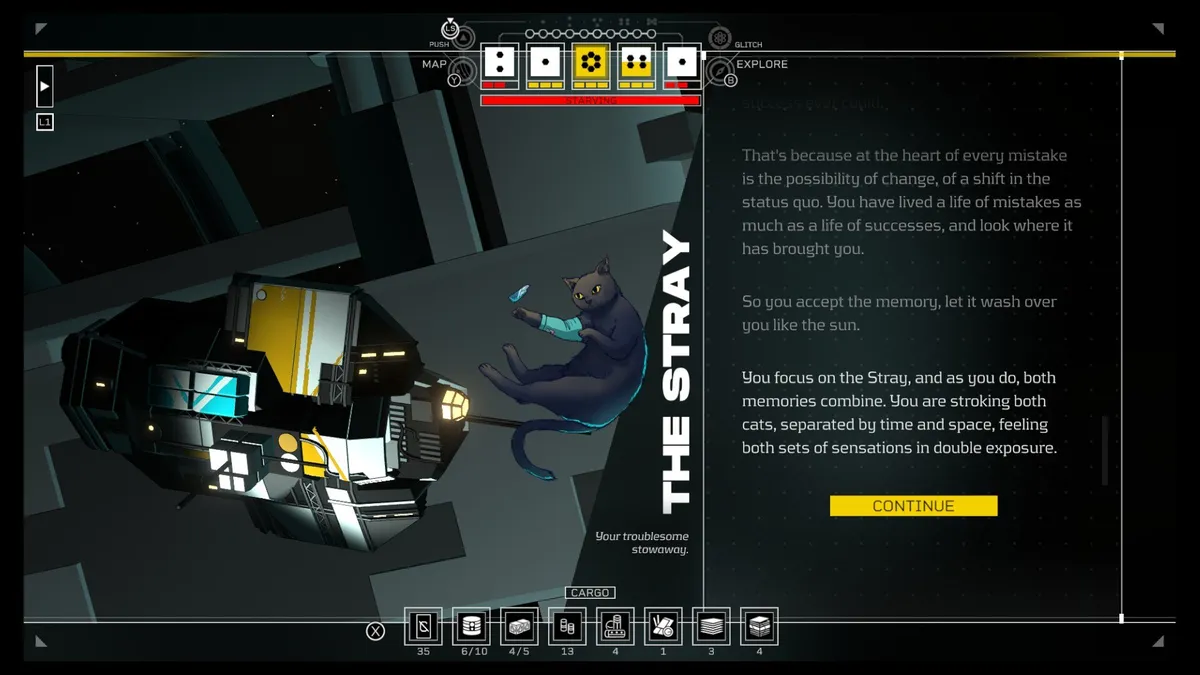
Obviously, Citizen Sleeper 2 is a well written video game, so of course the answers I seeked weren't there. I was met with a lot of discussions on identity. The main character is a Sleeper - an artificial entity with a consciousness copied from a human and pasted into their head - but they are also a Sleeper whose memories are erased at the beginning of the game. There is a version of themself that existed before their birth, and one that did after that, and neither of them are really, truly, them. Sleeper is exactly the person you decide they are, through the choices you make and the words you speak. They are you, basically. But how much of them is the people that came before? The Sleeper that was, and the person who sold their consciousness to a corporation, are for all intents and purposes dead, but their spirits linger. Sleeper gets flashes of memories that aren't theirs, and doesn't know what to make of them. How can we be ourselves, when our selves are so irreversibly linked to who we once were? Can people really change if their souls are trapped in this unavoidable prison? For a sleeper, a being created to be used and thrown away by corporate overlords, what does this all matter anyway?
Citizen Sleeper 2 handles this idea with patience and restraint. It lets you sit with these ideas for a while. You meet characters going through similar, if not the same, problems as you. You get to decide what your character makes of all this, but unlike other mechanics, the game lets you go between positions if you like, and genuinely explore your feelings on the topic. There is no right way to interpret the contents of Citizen Sleeper 2 or Sleeper’s journey throughout it. It's a very personal tale, in that sense.
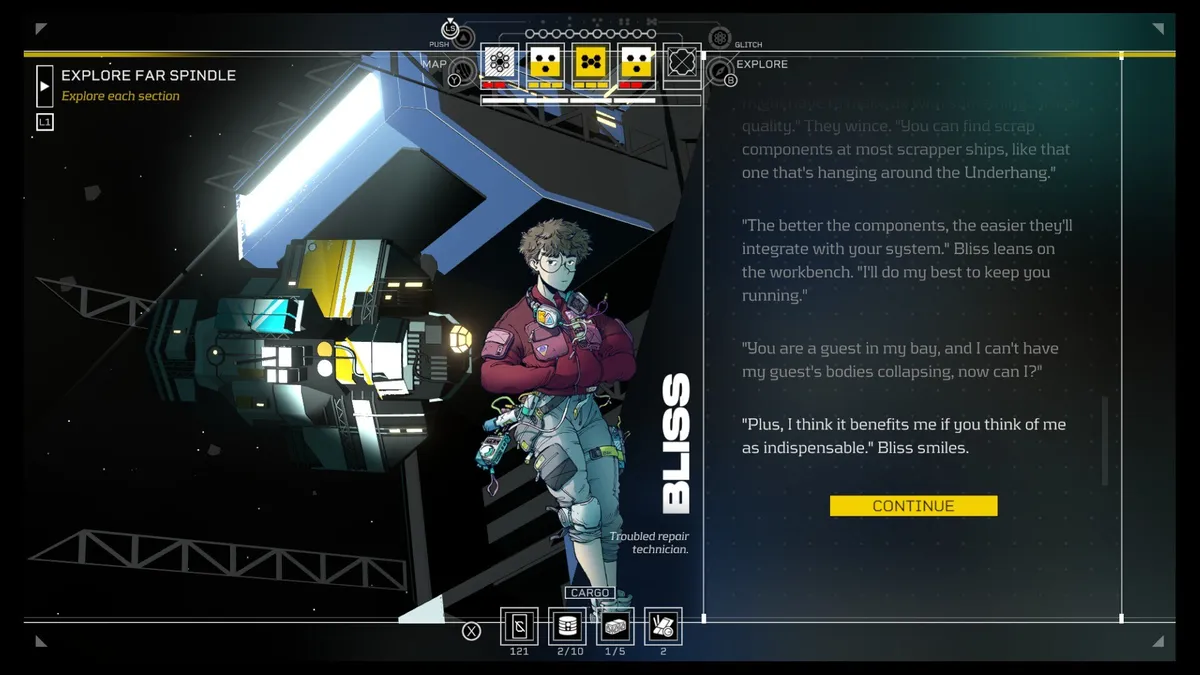
This idea also extends to Citizen Sleeper 2 as a sequel, a continuation of what came before. You get the sense that the creator themself is simultaneously grappling with this idea in the midst of production. Characters from the previous game return, some with greater significance than others, and at first, I found it a little disappointing. It felt a bit cheap, like the game was caving to references rather than crafting something new. But after a while, their presence came as something of a comfort. It's a weird experience meeting these guys again, because in-universe, your Sleeper knows nothing about them, but in real life, I feel inclined to help them out because I'm already fond of them based on the experiences of my previous Sleeper. In a way, it's like I've transferred the memories of one Sleeper over to another. Both Sleepers exist in my mind simultaneously, their experiences informing each other in impossible ways. Indeed, the game makes a quite deliberate note of this, by having returning characters greet you as a friend, before realising you're not the Sleeper they thought you were. They treat you well all the same. Is it not a beautiful thing that the Sleeper they knew left this impact on them that they carried their memory across the galaxy, and let it inform their perception of you? It's a cute moment, but it's also an encapsulation of the main theme in Citizen Sleeper 2.
Being alive means constantly experiencing new things, and with that comes an ever-increasing list of stuff to worry about. I have often wondered if life would be easier were I able to reset my brain, and start from square one. Would it help? The answer is no, of course. Even doing the real life equivalent of this - choosing to avoid problems and obligations altogether - doesn't work; it simply creates new anxieties. We are a collection of worriers, worrying our way through space and time until die and can worry no longer. Being a trans woman, I sometimes mourn the life I could have lived were I born cisgender. Would I be a more authentic woman then? I don't know, but I do know for a fact that I wouldn't be me.
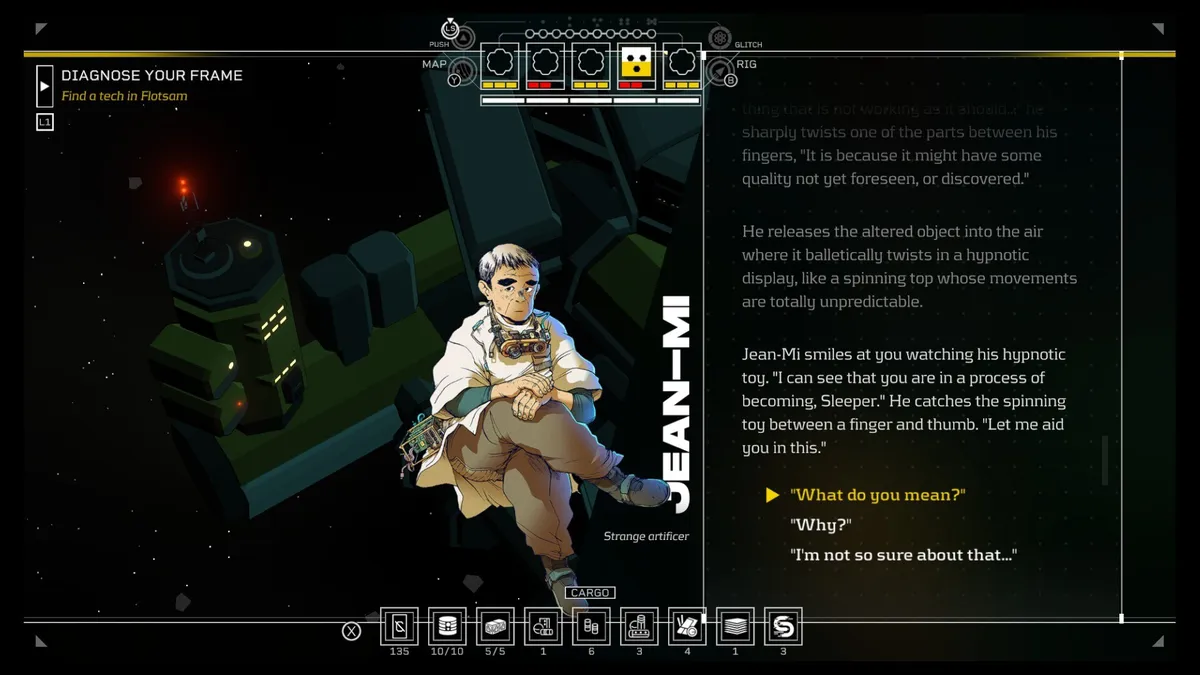
Citizen Sleeper 2: Starward Vector reminded me that there is purpose in living, despite the pain associated with it. Most likely, that struggle will never truly go away. It either stays with us, or becomes something else. But in that struggle, there is also joy, and purpose, and love. There are people to share in all of that too, waiting to hear and be heard. We often don't get to choose where we come from or what happens to us, what we remember and what we forget, but we do get to decide what to do now and forever. To quote Citizen Sleeper 2 directly: “it is worth and worthless, it is bent and broken, and it is beautiful in all of these things.”
